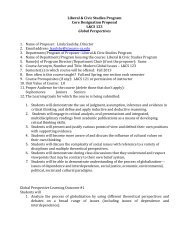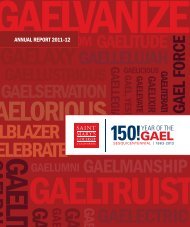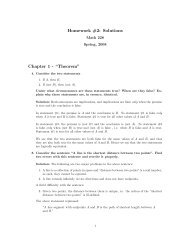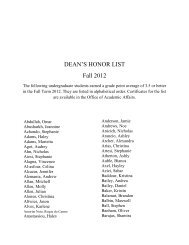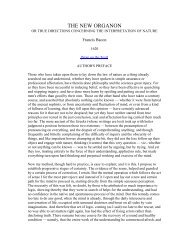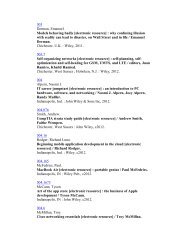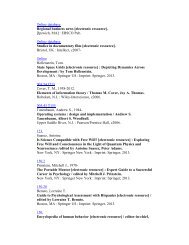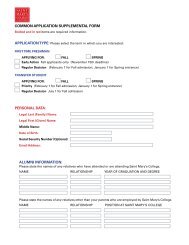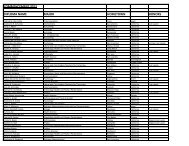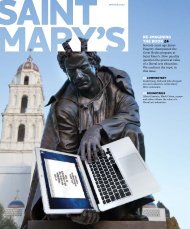School CurriculumMinor RequirementsA minimum acceptable grade <strong>of</strong> C– is required for coursework to counttoward the minor.SociologyThe minor in Sociology requires two lower-division courses(Sociology 2, Introduction to Sociology and Sociology 4, SocialProblems) and four upper-division Sociology electives.A combined Anthropology and Sociology minor requiresAnthropology 1, Introduction to Social and Cultural Anthropology,Sociology 2, Introduction to Sociology, and four upper-division coursesevenly divided between Anthropology and Sociology.Ethnic StudiesThe Sociology Department <strong>of</strong>fers a minor in ethnic studies. The minorallows a focus on two <strong>of</strong> the under-represented ethnic groups in theUnited States; it provides theoretical background on issues <strong>of</strong> ethnicity;and is interdisciplinary in nature. The minor requires the followingcourses: Anthropology 1 or Sociology 2, and Sociology or Anthropology112; two courses from Anthropology 119, Anthropology or Sociology123 (courses may be repeated for credit as content varies); eitherSociology 116 or History 136; Politics 110, and one upper-divisioncourse in History, English, or Modern Languages that covers either <strong>of</strong> thetwo ethnic groups which are a part <strong>of</strong> a student’s focus, i.e., English 153,154; Spanish 150; History 140, 141; Psychology 7, 165.Justice and CommunityThis multidisciplinary minor, which is housed within the Departments <strong>of</strong>Sociology and Anthropology, incorporates field research and issues <strong>of</strong>social justice into the experiences and curriculum <strong>of</strong> students pursuingcareers in social justice. The following courses are required:Lower-division RequirementsSociology 4 and either Economics 3 or 4, or Economics 10Upper-Division RequirementsTheory (1): Politics 115Theory/Praxis (1): An/Soc 122 or 124 or Religious Studies 129 orBusAd 181 (or 182) or Politics 106Electives (2): Sociology 116, 120, 122, 124, 128; BusAd 181 or 182;Communication 161, Econ 159, 152, 192; Politics 106, 110, 135;Religious Studies 140, 141, 143Capstone (1): Sociology or Anthropology 126C o u r s e sLOWER Division2 Introduction to SociologySociological theory, methods and the sociological perspective arestudied. This perspective enables students to see how the self, humanbehavior and attitudes are shaped by social structures and institutions,e.g., social class, popular culture, and the family. The social world is reexamined(social rules, deviance, gender, inequality, the economy, etc.).4 Social ProblemsAn overview <strong>of</strong> the causes, characteristics, and responses to socialproblems in the United States. Topics such as crime, substance abuse,racism, ageism, and family instability are studied through the sociologicalframework.UPPER DivisionAll upper-division courses have a prerequisite <strong>of</strong> any one <strong>of</strong> the followinglower-division Sociology or Anthropology courses: Anthropology 1,Sociology 2, Sociology 4, or the consent <strong>of</strong> the instructor.111 Kinship, Marriage, and FamilyA concentration on modern, westernized societies where kinshipand marriage are still the basis <strong>of</strong> society yet are undergoingsignificant changes.112 Race and EthnicityThis course presents sociology’s key concepts and theories in the study<strong>of</strong> race and ethnicity. Focusing primarily on the U.S., this course looks atthe cultural and social constructions <strong>of</strong> race and ethnicity.114 Urban StudiesTraces the development <strong>of</strong> modern communities, ranging from suburbsto the megalopolis. Studies the benefits and problems <strong>of</strong> contemporaryurban life and projects future trends based on sociological models.116 New Immigrants and RefugeesLooks at the attitudinal and legal reactions to immigrants and refugeesin the United States in this century. Emphasis is placed on the newAmericans, why they are coming, and how they differ from earliermigrants. Special attention is given to the impact <strong>of</strong> new immigrantgroups in <strong>California</strong>.118 Health and IllnessPresents social and cultural factors influencing health and illness. Looksat the roles <strong>of</strong> health-care pr<strong>of</strong>essionals, patients, and medical settings inour society. Discusses the relationships between the current health caresystem and the political and economic system.Students must take five courses outside their major. Sociology majorsmust take Sociology 124 in place <strong>of</strong> Sociology 4, and both electivesmust be outside the department. Politics students must choose oneelective outside their department; and Economics majors must take anadditional upper-division elective in place <strong>of</strong> Economics 10.PREREQUISITE GRADEAny course listed in this department with a prerequisite assumes a grade<strong>of</strong> C– or better in the prerequisite course. In addition, C is the minimumacceptable grade in Sociology 130 and 132 for credit toward the major.161
Curriculum Sociology120 Social Movements and Social ChangeEach course focuses on one or more social movements, which are collectiveactions aimed at social change. The course addresses factors thatcan bring about social movements and determine their success or failure.122 Education, Culture, and SocietyExamines formal education from a sociocultural perspective. Providesstudents with an understanding <strong>of</strong> the concepts <strong>of</strong> schooling and learning,<strong>of</strong> culture and culture reproduction, the linkages <strong>of</strong> education toother social institutions, the school as a social organization, and the role<strong>of</strong> education in the transmission <strong>of</strong> culture and social change. Emphasis isplaced on the political, religious, ethnic and economic aspects <strong>of</strong> educationshown by ethnographic studies <strong>of</strong> schooling in the United States andcross-culturally.123 Ethnic Groups in the United StatesEach course in this series looks at one <strong>of</strong> the following American ethnicgroups: Latino, Asian-American, African-American. While emphasizingthe contemporary period, each course focuses on the social, cultural andhistorical experiences <strong>of</strong> each group. Areas covered are assimilation andresistance, distribution in the social and power structure, family systemsand cultural values, labor and migration, role <strong>of</strong> religion, status <strong>of</strong>women, etc. May be repeated for credit as content varies.124 Justice and CommunityAddresses the use <strong>of</strong> state power in the carrying out <strong>of</strong> crime control,retribution and the overall protection <strong>of</strong> the community. The course hasthree main parts: a theoretical look at how we have ended up with thejustice system that we have today; the practice <strong>of</strong> justice through fieldstudies on police, courts, and prisons; and an in-depth investigation intoan area <strong>of</strong> criminal justice <strong>of</strong> current relevance (such as “Three Strikes,”the expansion <strong>of</strong> prisons, or race and justice).125 Gender and CultureWhile sex differences are biological, gender encompasses the traitsthat culture assigns to and inculcates in males and females. This coursestudies the latter: the interplay between gender and culture. It takes aninclusive and cross-cultural perspective, with a focus on men and womenin differing cultural contexts such as ethnic group membership andsocioeconomic status.126 Field ExperienceOpportunity for students to gain hands-on experience conductingsociological analysis in the field. Supervised work in community agencies,government bureaus, museums, and political or industrial organizations.128 Crime and DelinquencyThe course addresses different theoretical and sociological approachesto crime, follows changes in these approaches over time and looksat how these changes reflect broader shifts in our comprehension <strong>of</strong>human nature and behavior. Students gain insights not only to changesin the understanding <strong>of</strong> crime but also to changes in our fundamentalview <strong>of</strong> human behavior.132 Sociological Research MethodsLogic <strong>of</strong> research procedures and the theoretical and practical issuesarising from sociological research. Skills and methods <strong>of</strong> designing andanalyzing research explored in readings and exercises. Design <strong>of</strong> anoriginal research proposal. Students must have completed Anthropology1: Introduction to Social and Cultural Anthropology and Sociology 2:Introduction to Sociology. This course should be taken the lastsemester <strong>of</strong> the junior year or in the senior year.133 Senior ThesisContinuation <strong>of</strong> Research Methods course where honor studentsundertake individual research, culminating in the senior project. Thisshould be taken in the senior year.134 Contemporary Social IssuesEach contemporary social issues course concentrates on one particularsocial problem in the United States today. Areas covered include racism,classism, sexism, ageism, poverty, environmental degradation as well asdeviance. Among the topics covered in regard to these issues are causation,stratification <strong>of</strong> resources, distribution <strong>of</strong> power and attempts toresolve these problems. May be repeated for credit as content varies.135 Special TopicsSpecial topics in sociology include such issues as international race relations,criminology and emotion, sociology <strong>of</strong> disaster, sociology <strong>of</strong> film,and other topics. May be repeated for credit as content varies.195 Special Study InternshipThis course is usually taken by an upper-division student who wishes tocomplete his/her education with related work experience and is maintainingat least a C average. In addition to work experience (6-8 hoursper week), outside research and a term project are usually required.Sponsorship by a Sociology faculty member and approval <strong>of</strong> the departmentchair is required.197 Independent StudyThis course entails independent study or research for students whoseneeds are not met by courses available in the regular <strong>of</strong>ferings <strong>of</strong> thedepartment. The course usually requires the writing <strong>of</strong> a term project.Sponsorship by a Sociology faculty member and approval <strong>of</strong> the departmentchair is required.199 Special Study — HonorsThis course is only available to upper-division majors with a B averageor higher and entails independent study or research under the supervision<strong>of</strong> a Sociology faculty member. Approval <strong>of</strong> the department chairis required.130 Sociological TheoryAnalysis <strong>of</strong> the works <strong>of</strong> major theorists who have influenced sociology.Emphasis on explaining what is essential about particular theoreticalframeworks, how they can be used, and why they should be studied.Students must have completed Sociology 2: Introduction to Sociology.This course should be taken in the senior year.162



